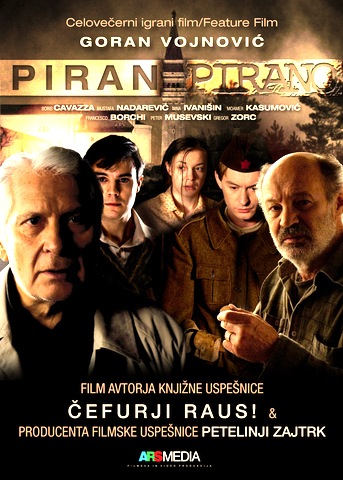 By Joe Bendel. How better to start the 2011 Bosnian-Herzegovinian Film Festival than with a film about the arbitrary nature of geography? Antonio is Italian. Veljko is Bosnian. Yet both have only felt truly at home in a particular apartment in the picturesque Slovenian city of Piran. That is where their paths fatefully crossed during WWII in Slovenian filmmaker Goran Vojnović’s Piran-Pirano (trailer here), the opening film of the 2011 BHFF in New York.
By Joe Bendel. How better to start the 2011 Bosnian-Herzegovinian Film Festival than with a film about the arbitrary nature of geography? Antonio is Italian. Veljko is Bosnian. Yet both have only felt truly at home in a particular apartment in the picturesque Slovenian city of Piran. That is where their paths fatefully crossed during WWII in Slovenian filmmaker Goran Vojnović’s Piran-Pirano (trailer here), the opening film of the 2011 BHFF in New York.
Antonio was not a Fascist, but his father certainly was. A school teacher whose lesson plans were little more than hateful propaganda, he decides discretion is the better part of valor when Tito’s forces arrive. Only concerned with his own neck, he leaves his college-aged son behind in their flat. Through sheer fortune, Antonio eludes the Partisans’ initial sweep of the apartment, but he is caught flat-footed by Anica, a young Slovenian woman traveling with the partisans.
Mourning her entire family, the vengeful Anica is in no mood to show mercy to an Italian, yet they reach an uneasy truce of sorts for the night. It is there in the apartment that Veljko discovers them. Like Anica, he has also lost his family, but he is not inclined towards retribution. In fact, he is not much of a soldier at all.
Told in flashbacks when the two men meet again decades later, Piran’s themes of cruelty and compassion in times of war have obvious resonance for Bosnian audiences. It hardly glorifies Tito’s army either, clearly depicting the summary executions ruthlessly carried out by the Communist forces. The commander matter-of-factly accepts the brutal tactics, as well as the potential death of innocents, as the cost of waging war. However, some of his subordinates are more enthusiastic about the dirty business of war.
Perched on the Adriatic, Piran is a remarkably beautiful city, which sparkles all the more through the lush lens of Radovan Cok. It is a finely crafted period production all the way around, but Vojnović maintains a resolutely intimate focus on his three principle characters. It is a strong cast, especially Boris Cavazza, whose Antonio comes across as a fully dimensional, deeply haunted human being, while also largely serving as the spokesman for the film’s circumspect critique of war (even a good war, like WWII). Though somewhat manic and nebbish, Mustafa Nadarević (a prominent Bosnian actor probably best known in America for When Father was Away on Business) is also quite touching as old Veljko.
A profoundly humanistic film, but in a way also a lyrical love story, Piran has real commercial potential on the American art-house circuit. Sensitively produced and honestly rendered, it a first-rate representative of Slovenian cinema (with obvious Bosnian interest). Indeed, Piran was an excellent selection to launch this year’s BHFF, one of the friendliest and most provocative New York festivals, which concluded recently at the Tribeca Cinemas.
Posted on May 16th, 2011 at 8:50am.
One thought on “LFM Review: Piran-Pirano @ The 2011 Bosnian-Herzegovinian Film Festival”
Comments are closed.